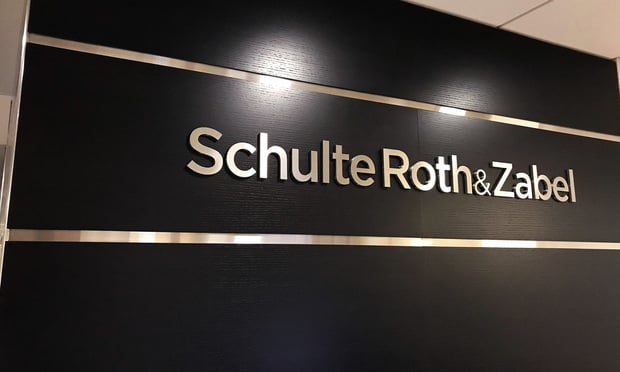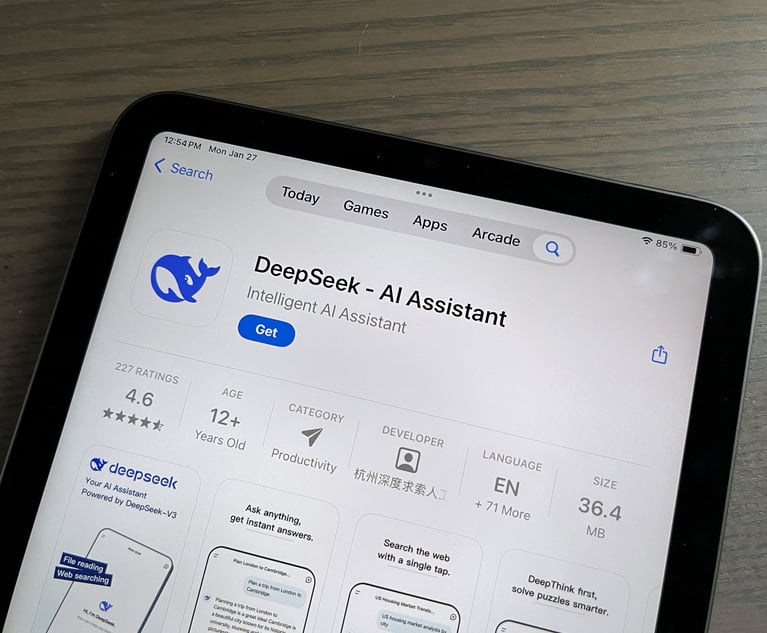How Schulte Roth Gave Associate Life an Extreme Makeover
In two years, the firm went from 78th to first in our Midlevel Associates Survey.
August 26, 2018 at 06:00 PM
4 minute read
The original version of this story was published on The American Lawyer
 Schulte Roth & Zabel's office in Washington, D.C.
Schulte Roth & Zabel's office in Washington, D.C.
This year, Schulte Roth & Zabel can count itself as the firm where midlevel associates are happiest. But two years ago, it was a very different story.
In 2016, the firm came in at 78th on The American Lawyer's midlevel associate satisfaction rankings.
“It was a big billboard saying, 'You should look and see if you can do this better,'” says partner Dan Kusnetz, who co-leads the firm's associate committee. “We had let the gardens go unpruned and untended because of the crush of work and the financial crisis.”
What partners at the firm noticed, he says, was much higher satisfaction ratings from summer associates. So they looked for a way to bridge those results.
The firm combined its professional development and recruiting functions into a single department and named a manager of associate relations, who had been a summer associate at the firm years ago. It also revamped the associates committee, putting Kusnetz and partner Michael Mezzacappa at the helm. They had previously run the summer associates program.
“The whole concept was to get the firm to be open to and responsive to associates' needs … instead of just sort of lip-service,” Kusnetz says.
The associates committee went on a listening tour and identified seven categories of issues facing young lawyers: mentoring; caregiver leave; business development resources; training; informal networking; technology; and general “things that make life easier,” Kusnetz says. In each of those areas, he says, the firm has already made improvements.
Schulte Roth created a more elaborate mentor network, which helps associates connect with multiple lawyers senior to them within and beyond their practice areas. The average associate has three mentors.
The firm updated parental leave to include secondary caregivers and better on-ramps for the return to work. It started a training program for business development and various other aspects of legal practice, including pro bono and wellness.
There are now associate lunches and bagel Fridays for networking, as well as town halls. And associates were involved in testing new technology, tending toward more mobile-enabled options. As for making life generally easier, Kusnetz gave one example: a mailroom dinner runner to save associates the time of grabbing a meal when they're working late.
All of those changes have come about in less than two years.
“A great deal of financial resources have been dedicated to this,” Alissa Golden, the firm's director of professional development and recruiting, says.
The firm has touched on each of the seven categories in at least one way, but it's not done. The committee is planning another listening tour for the coming year.
“We don't want this to be a one-shot effort; we want this to be a cultural shift,” Kusnetz says.
The one thing associates have discussed that has not yet been implemented, he says, is remote work and work-from-home capabilities.
“We are, as a culture, very used to having all of us be present. It's a very big cultural shift,” he says.
It's something the associates committee is studying.
So what's the return on investment? Kusnetz says that's difficult to measure in terms of productivity or attrition—most defections are to clients rather than to other law firms, he notes. But morale appears to have improved, he says.
“The return on investment is happy people,” he says. “The life of associates today is very different. We had to make a change in mindset and realize that millennials often have different goals than a baby boomer.”
Email: [email protected]
This content has been archived. It is available through our partners, LexisNexis® and Bloomberg Law.
To view this content, please continue to their sites.
Not a Lexis Subscriber?
Subscribe Now
Not a Bloomberg Law Subscriber?
Subscribe Now
NOT FOR REPRINT
© 2025 ALM Global, LLC, All Rights Reserved. Request academic re-use from www.copyright.com. All other uses, submit a request to [email protected]. For more information visit Asset & Logo Licensing.
You Might Like
View All
Eighth Circuit Determines No Standing for Website User Concerned With Privacy Who Challenged Session-Replay Technology
7 minute read
The Time Is Now for Employers to Assess Risk of Employees’ Use of DeepSeek
4 minute read
Fired by Trump, EEOC's First Blind GC Lands at Nonprofit Targeting Abuses of Power
3 minute read
Houston Law Firm Files $250K Breach of Contract Suit Against 2 Former Lawyers
3 minute readTrending Stories
- 1Public Notices/Calendars
- 2Wednesday Newspaper
- 3Decision of the Day: Qui Tam Relators Do Not Plausibly Claim Firm Avoided Tax Obligations Through Visa Applications, Circuit Finds
- 4Judicial Ethics Opinion 24-116
- 5Big Law Firms Sheppard Mullin, Morgan Lewis and Baker Botts Add Partners in Houston
Who Got The Work
J. Brugh Lower of Gibbons has entered an appearance for industrial equipment supplier Devco Corporation in a pending trademark infringement lawsuit. The suit, accusing the defendant of selling knock-off Graco products, was filed Dec. 18 in New Jersey District Court by Rivkin Radler on behalf of Graco Inc. and Graco Minnesota. The case, assigned to U.S. District Judge Zahid N. Quraishi, is 3:24-cv-11294, Graco Inc. et al v. Devco Corporation.
Who Got The Work
Rebecca Maller-Stein and Kent A. Yalowitz of Arnold & Porter Kaye Scholer have entered their appearances for Hanaco Venture Capital and its executives, Lior Prosor and David Frankel, in a pending securities lawsuit. The action, filed on Dec. 24 in New York Southern District Court by Zell, Aron & Co. on behalf of Goldeneye Advisors, accuses the defendants of negligently and fraudulently managing the plaintiff's $1 million investment. The case, assigned to U.S. District Judge Vernon S. Broderick, is 1:24-cv-09918, Goldeneye Advisors, LLC v. Hanaco Venture Capital, Ltd. et al.
Who Got The Work
Attorneys from A&O Shearman has stepped in as defense counsel for Toronto-Dominion Bank and other defendants in a pending securities class action. The suit, filed Dec. 11 in New York Southern District Court by Bleichmar Fonti & Auld, accuses the defendants of concealing the bank's 'pervasive' deficiencies in regards to its compliance with the Bank Secrecy Act and the quality of its anti-money laundering controls. The case, assigned to U.S. District Judge Arun Subramanian, is 1:24-cv-09445, Gonzalez v. The Toronto-Dominion Bank et al.
Who Got The Work
Crown Castle International, a Pennsylvania company providing shared communications infrastructure, has turned to Luke D. Wolf of Gordon Rees Scully Mansukhani to fend off a pending breach-of-contract lawsuit. The court action, filed Nov. 25 in Michigan Eastern District Court by Hooper Hathaway PC on behalf of The Town Residences LLC, accuses Crown Castle of failing to transfer approximately $30,000 in utility payments from T-Mobile in breach of a roof-top lease and assignment agreement. The case, assigned to U.S. District Judge Susan K. Declercq, is 2:24-cv-13131, The Town Residences LLC v. T-Mobile US, Inc. et al.
Who Got The Work
Wilfred P. Coronato and Daniel M. Schwartz of McCarter & English have stepped in as defense counsel to Electrolux Home Products Inc. in a pending product liability lawsuit. The court action, filed Nov. 26 in New York Eastern District Court by Poulos Lopiccolo PC and Nagel Rice LLP on behalf of David Stern, alleges that the defendant's refrigerators’ drawers and shelving repeatedly break and fall apart within months after purchase. The case, assigned to U.S. District Judge Joan M. Azrack, is 2:24-cv-08204, Stern v. Electrolux Home Products, Inc.
Featured Firms
Law Offices of Gary Martin Hays & Associates, P.C.
(470) 294-1674
Law Offices of Mark E. Salomone
(857) 444-6468
Smith & Hassler
(713) 739-1250








